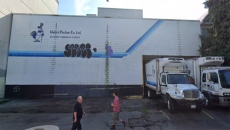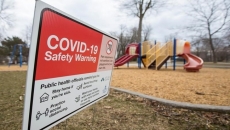TORONTO - Efforts to contain the rapid spread of COVID-19 in Canada's federal prisons have led to an increase in tensions that have prompted correctional officers to use force on at least two occasions in recent days, according to a prominent prisoner rights group.
Information from prisoners, the John Howard Society said, was that guards at the Donnacona maximum security prison in Quebec used tear gas and rubber bullets on inmates on Tuesday to quell unrest, leaving at least one injured. In another incident, they said guards used percussion grenades at the medium security Collins Bay institution in Ontario.
Severe virus outbreaks have occurred at the Jolliette prison in Quebec among other penal institutions. Although testing and information has been sparse, at least 189 federal inmates and 67 guards have been infected, according to latest available figures. At least one prisoner has died.
The data suggest the spread among the 14,000-strong prison population far exceeds that of the general population. Authorities have responded by locking down inmates and placing those infected in "medical isolation." In some cases, inmates have been placed in segregation cells.
The result has been a disruption in routines, depriving inmates of normal activities and interpersonal contact, causing stress and exacerbating mental health concerns.
"If prisoners are locked down for extended periods of time, which they are being with no activities and no visits and limited access to canteens and things like that, they get agitated," said Catherine Latimer, the society's executive director. "It's not a good thing."
Latimer said inmates told her guards at Donnacona Institution used tear gas and rubber bullets this week in response to inmates covering their cell windows, hitting several prisoners. She also said inmates at Collins Bay protested the failure of guards to wear masks last week by refusing to return to their cells. Correctional officers arrived at five o'clock in the morning and were reported to have used percussion grenades, she said inmates told her.
"That's very heavy-handed use of force," Latimer said.
Correctional authorities did not respond to a request for information on the reported incidents.
Prison ombudsman, Ivan Zinger, refused to discuss the situation: "We are aware and we are investigating," Zinger said in an email.
To ease the situation, several groups have called on the federal government to use its executive powers to release large numbers of low-risk inmates. They say those already on some form of parole or allowed unescorted absences as well as others could be let out on conditions such as strict house arrest.
Older inmates and those with medical conditions — groups known to be particularly vulnerable to the virus — should be given priority for release, advocates say. Unused student residences or military barracks could be used to house them, they suggest.
"To date, nothing like that has been implemented," said Sen. Kim Pate, who has been calling for immediate action since March 13. "It's very late."
Correctional Service Canada said it was "conducting an analysis of the offender population" so it could make release recommendations.
Pate said the government could exercise its powers to release lower-risk inmates. But a spokeswoman for Public Safety Minister Bill Blair said authorities had asked the Parole Board of Canada to do its part.
In response, the board said it had been trying to streamline processes and speed up decisions. In some cases, parolees might be allowed to move home instead of to a half-way house, the board said.
Activist David Milgaard, who spent 23 years in prison for a murder he did not commit, called on Prime Minister Justin Trudeau and correctional authorities to act urgently. For some inmates, exposure to coronavirus could be fatal, he said.
"It's documented that 80 per cent of the people that are in there are no real threat," Milgaard said from Alberta. "They weren't sentenced to death."
In a statement Thursday, the union representing guards said the prison system had been unprepared for the emerging pandemic and slow to react.
"A reactive and slow response only endangers staff, inmates and the general public," said Jeff Wilkins, president of the Union of Canadian Correctional Officers.
On Tuesday, a prisoner at Joliette who contracted COVID-19 filed a proposed class-action lawsuit against Correctional Service Canada's handling of the pandemic. The unproven claim asserts officials were too slow to implement protective measures.
Picture :Istock
.jpg)





